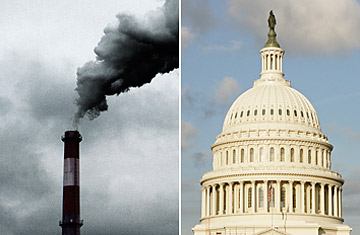
If it's this hard for Democrats to agree on tough global warming curbs, polar icecaps beware.
With the greenest lawmakers in charge and the President cheering them on, the prospects of sweeping controls on greenhouse gases seemed rosy. After a month of fighting among themselves, however, House Democrats announced an agreement Thursday that reflects more about the legislative process than the need to stop the planet from heating up. (See pictures of the effects of climate change.)
The announcement indicates that sponsors have enough Democratic votes to push a bill past its first legislative hurdle, the House Energy and Commerce Committee, as early as next week. But the patchwork of concessions necessary to win over champions of industrial and regional interests weakened the initiative, leaving it far short of the global warming gas reductions that scientists insist are necessary to stave off catastrophic climate change.
"It's unacceptable to base this bill on politics, instead of good science," said Greenpeace's Damon Moglen.
The biggest concession to all industrial burners of fossil fuels raised the national cap on greenhouse gas emissions from the original proposal of 5.7 billion metric tons (BMT) by 2020 to 5.9 BMT. The difference may seem nominal until you consider what the elite scientific body, the International Panel on Climate Change, urges for the same timeline — a cap of at least 1.3 BMT lower. Only then will there be 50% chance of avoiding a major warming.
The initial House proposal triggered opposition by many of the biggest polluters, including electric utilities and industries that burn carbon-heavy coal. They would have to obtain permits for each ton of warming gases — chiefly carbon dioxide — limited by the cap. The bill didn't specify how the permits would be allocated or how much those permits might cost. Environmentalists wanted the government to auction them, with the proceeds used to lighten ratepayer utility bills inflated by the higher costs of running power plants and to subsidize energy efficiency measures. (See pictures of this fragile earth.)
But Democrats devised a permit allocation system to line up committee support. To woo lawmakers from districts powered by coal-fired utilities in the Midwest and Southeast, the agreement would give away 35% of the permits to electric utilities until 2025 while they make a transition to cleaner fuels or develop carbon capture technology. Research for such technology would be subsidized by billions of dollars raised from government auctions.
The compromise also loosened a requirement on states to generate 25% of their electricity with renewable fuel by 2025. That goal was lowered to 20% by 2020. And, as a concession to Southern states that lack sources of solar and geothermal power, the agreement provides credit for nuclear and hydro generation of electric power.
Another 15% of permits would be given free of charge to energy-intensive factories in the Rustbelt, such as steel, glass, cement, aluminum and paper plants, which would become less competitive internationally if they had to pay for permits. For its part, the hard-hit auto industry would be treated to 3% of the permits to encourage domestic production of electric and fuel efficient vehicles.
Facing blanket Republican opposition, Chairman Henry Waxman had to nail down support from all but six Democrats on his Energy and Commerce. The liberal Californian, a longtime environmental leader, predicted passage by the end of next week. Virginia Democrat Rick Boucher, who represented coal country Democrats in talks with Waxman, concurred. It would be the first global warming bill to get that far in the House, which is expected to easily pass the measure that is a key part of President Obama's agenda. Legislation faces a bigger challenge in the Senate, where influential Democrats oppose it.
Waxman said at a Thursday briefing that despite the higher emissions cap, negotiators were "careful to look at what scientists are saying" and that a House bill would allow Obama to "assume a leadership position" at a December international global warming meeting in Copenhagen.
But Greenpeace's Moglen said the low targets would "handcuff" the President in talks with European leaders who are considering the more ambitious IPCC goals. Free credits, he said, would free industry from its responsibility to clean up.
Frank O'Donnell of Clean Air Watch had more sympathy for Waxman, who, he said, was "working with a pretty bad hand. The only way he was going get something through his committee was to move to the right and make an awful lot of concessions.
It's probably better than the alternative, which is nothing at this point. It's politics."
